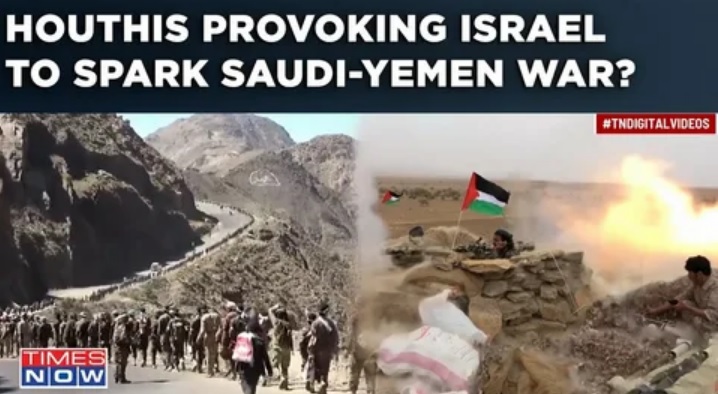
The Yemeni group's steadfast attacks over two years turned it from insurgent rebels to a key regional player, ‘The Middle East Eye’ writes.
As a fragile ceasefire takes hold in Gaza between Israel and Hamas, another military actor in the region has also apparently halted hostilities: the Houthis in Yemen.
Its leader Abdul-Malik al-Houthi reportedly ordered fighters to stop the attacks on Israel and Israeli-linked ships, which the group had carried out intermittently for two years.
The halt would only hold as long as Israel continued to observe the ceasefire in Gaza, a source told Saudi media.
That condition underscores a position of strength: the Houthis have consistently carried out attacks in solidarity with Palestinians without the need to negotiate with Israel – directly or indirectly – about a truce.
Across two years of Israeli wars in the region and the genocide in Gaza, a number of groups have taken up arms in response.
Military resilience
"Militarily, the Houthis have had a strong two-year run for a non-state actor," Andreas Krieg, assistant professor at King's College London's defence studies department, told Middle East Eye.
He cited its year-and-a-half long campaign attacking international shipping in the Red Sea, forcing major vessels travelling from Europe to Asia to take a lengthy, expensive route around the Cape of Good Hope at the southern tip of Africa.
As a result of the attacks, carried out in solidarity with Palestinians under Israeli genocide, maritime traffic via the Gulf of Aden dropped 70 percent in two years.
“The Houthis forced America to decouple from Israel in terms of a Yemeni front,” Ali Rizk, security analyst said.
The Houthis also conducted periodic long range shots on Israel, said Krieg, "while riding out Israeli reprisals with only short dips in tempo".
One of those strikes briefly halted traffic at Ramon Airport in southern Israel, while a more recent attack broke Israeli air defences and struck a hotel in the resort city of Eilat.
In addition to attacking Israel and global vessels, there was a months-long onslaught from the US too.
"When the Americans took part and bombed Yemen, the [Houthis] responded, and in the end Trump backed down," Ali Rizk, a Lebanese political and security analyst, told MEE.
The Americans reportedly spent over $1bn on the campaign attacking Yemen, and yet failed to establish air superiority over the Houthis.
The attacks by the US and Israel resulted in scores of deaths, including many civilians. Military infrastructure was hit too, and a number of operatives killed. But the Houthis don't seem to have been deterred.
"The engine of that resilience is how they're built: a network of networks – tribal, clerical, security and commercial nodes with overlap and redundancy," said Krieg. "Knock out a leader or a depot and the system limps, but it rarely stops."
There were a number of factors that helped the Houthis fare better than other armed groups which took up the fight with Israel.
One of them is its comparatively new entry onto the international conflict arena.
"The Israelis don't have a lot of intelligence they can work with to inflict real harm on the Houthis," said Rizk.
"It's easy for Israel to carry out an all-out war on Lebanon. That's not the case with Yemen, which is further away," said Rizk. "The Houthis [can] maintain attacks against Israel without paying the heavy price which Hezbollah or Lebanon might pay."
Narrative victory
The war also provided the Houthis with a narrative victory too - at home and abroad.
"The Houthi intervention in the Red Sea furthered their domestic legitimacy and brought international fame and recognition," Arwa Mokdad, an expert analyst on Yemen and geopolitics, told MEE.
Mokdad said that the attacks on shipping furthered the idea that the Houthis fought against oppression, while also making it awkward for regional players to intervene and be accused of "attacking a group aiding Gaza".
For that reason, many countries in the region were reluctant to publicly put their name on a US-led naval task force fighting against Houthi attacks in the Red Sea.
"In the face of Arab inaction, the Houthis have risen as a powerful force in Arab imagination and discourse," said Mokdad.
While the Houthis have long been described as a "rebel" Iran-backed group, that framing may now be changing.
"They've moved from Yemeni insurgency to headline player inside the Axis of Resistance – the only Arab actor routinely striking inside Israel – giving them narrative weight beyond their size," said Krieg.
"Abdul-Malik al-Houthi has also always underscored that the Americans and the Israelis are two faces of the same coin," he said. "What happened in Qatar supports the Houthi argument," he added, referring to Israel's attack on Hamas officials in Doha last month.
That attack took place despite Qatar being a major US ally hosting over 8,000 American troops.
Eleonora Ardemagni, a researcher and expert on Yemeni armed groups, told MEE that the war gave the Houthis the opportunity of "maximising internal gains in terms of support and recruitment".
The number of Houthi fighters grew from 220,000 in 2022 to 350,000 in 2024, according to UN experts.
"With the ceasefire between Israel and Hamas, the big question is now whether the Houthis will rethink their strategy," Ardemagni said.
"And how they will try to consolidate their regional position as Middle Eastern tensions de-escalate."
read more in our Telegram-channel https://t.me/The_International_Affairs

 11:50 14.10.2025 •
11:50 14.10.2025 •






















